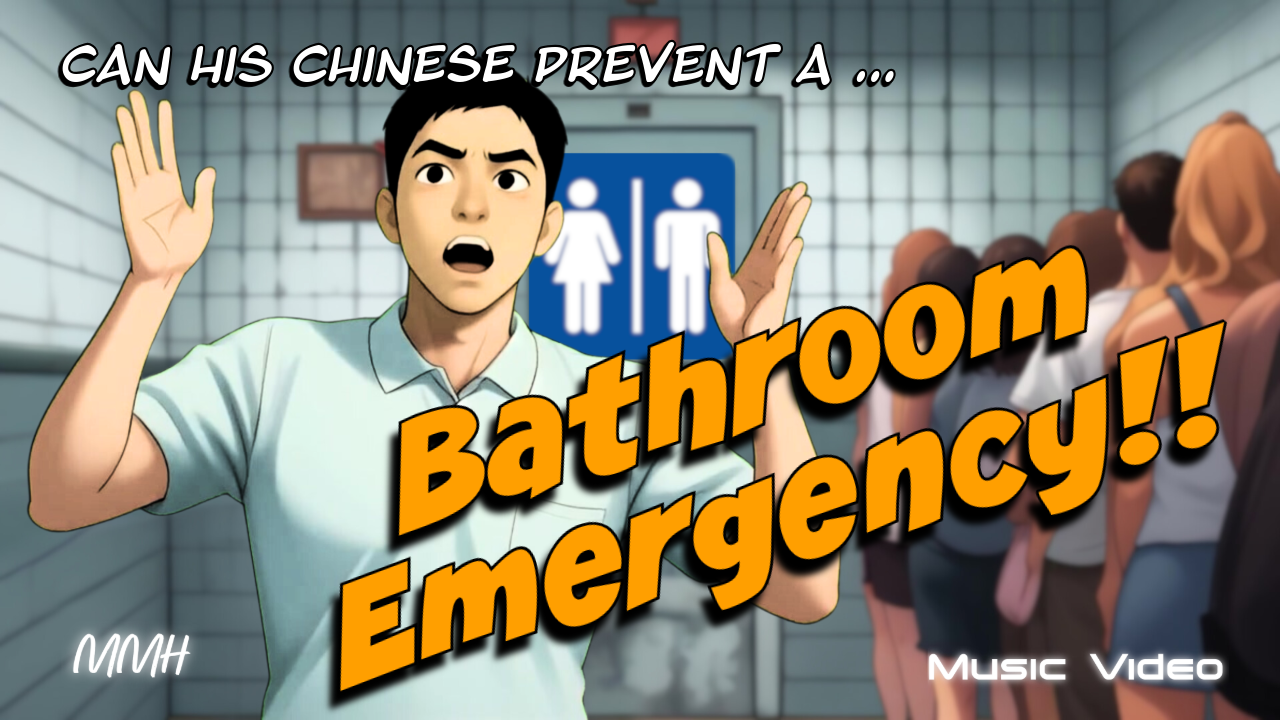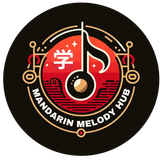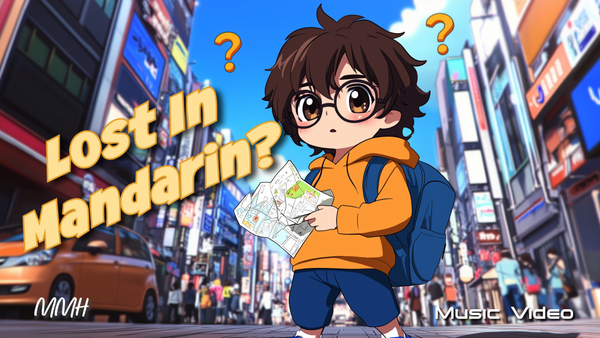Embarrassing Chinese Phrases: Bathroom Edition! 💩😱

When nature calls urgently, you need to know exactly how to ask for help in Chinese – master essential bathroom vocabulary through this hilariously relatable emergency.
🎵 Watch & Listen
Originally Released October 17, 2024
🎮 Practice with Interactive Flashcards
Ever been caught in a bathroom emergency? This hilarious Mandarin music video turns the awkward situation of asking for the bathroom in Chinese into a catchy tune that'll stick in your head (and hopefully save you from sticky situations). Practice all the essential restroom vocabulary with our interactive flashcards!
→ Practice "Bathroom Emergency" Flashcards
The Story Behind the Song
We've all been there - that moment when nature calls and you desperately need to find a bathroom, but you're in a foreign country and don't know how to ask! This reggae-soul fusion song follows our protagonist through a bubble tea-induced crisis that becomes increasingly urgent by the minute.
Our hero starts confident after drinking too much bubble tea, but quickly discovers that finding a bathroom in an emergency situation requires more than just basic Chinese phrases. From broken toilets to occupied stalls to long lines, every obstacle makes the situation more desperate. This song captures that universal experience of bathroom emergencies while teaching you the most practical Chinese phrases you'll ever need.
The educational value is immediately clear - bathroom vocabulary is among the most essential phrases any traveler or language learner needs to master. But what makes this song special is how it combines practical necessity with comedic storytelling, making these crucial phrases unforgettable. Plus, the surprising plot twist ending adds an extra layer of humor that'll keep you coming back to practice these phrases!
Complete Song Lyrics
[Intro]
{我|wǒ - I}{喝|hē - drink}{了|le - past tense}{太|tài - too}{多|duō - much}{珍珠|zhēn zhū - pearl}{奶茶|nǎi chá - milk tea} "{Wǒ|我 - I} {hē|喝 - drink} {le|了 - past tense} {tài|太 - too} {duō|多 - much} {zhēn zhū|珍珠 - pearl} {nǎi chá|奶茶 - milk tea}" - I drank too much bubble tea
I drank too much bubble tea
{现在|xiàn zài - now}{肚子|dù zi - stomach}{不|bù - not}{舒服|shū fu - comfortable} "{Xiàn zài|现在 - now} {dù zi|肚子 - stomach} {bù|不 - not} {shū fu|舒服 - comfortable}" - Now my stomach feels uncomfortable
Now my stomach feels uncomfortable
{我|wǒ - I}{需要|xū yào - need}{找|zhǎo - find}{洗手间|xǐ shǒu jiān - restroom}, oh man! "{Wǒ|我 - I} {xū yào|需要 - need} {zhǎo|找 - find} {xǐ shǒu jiān|洗手间 - restroom}" - I need to find a bathroom
I need to find a bathroom, oh man!
[Chorus]
{洗手间|xǐ shǒu jiān - restroom}{在|zài - at}{哪里|nǎ lǐ - where}?{我|wǒ - I}{很|hěn - very}{急|jí - urgent}! "{Xǐ shǒu jiān|洗手间 - restroom} {zài|在 - at} {nǎ lǐ|哪里 - where}? {Wǒ|我 - I} {hěn|很 - very} {jí|急 - urgent}!" - Where's the bathroom? It's urgent!
Where's the bathroom? It's urgent!
{洗手间|xǐ shǒu jiān - restroom}{在|zài - at}{哪里|nǎ lǐ - where}?{我|wǒ - I}{很|hěn - very}{急|jí - urgent}! "{Xǐ shǒu jiān|洗手间 - restroom} {zài|在 - at} {nǎ lǐ|哪里 - where}? {Wǒ|我 - I} {hěn|很 - very} {jí|急 - urgent}!" - Where's the bathroom? It's urgent!
Where's the bathroom? It's urgent!
{请|qǐng - please}{帮帮|bāng bāng - help}{我|wǒ - I},{快要|kuài yào - about to}{出事|chū shì - have accident}{了|le - particle}! "{Qǐng|请 - please} {bāng bāng|帮帮 - help} {wǒ|我 - I}, {kuài yào|快要 - about to} {chū shì|出事 - have accident} {le|了 - particle}!" - Please help me, I'm about to have an accident!
Please help me, I'm about to have an accident!
[Verse 2]
{对不起|duì bu qǐ - excuse me},{请问|qǐng wèn - may I ask}{一下|yī xià - a moment} "{Duì bu qǐ|对不起 - excuse me}, {qǐng wèn|请问 - may I ask} {yī xià|一下 - a moment}" - Excuse me, may I ask a question?
Excuse me, may I ask a question?
{洗手间|xǐ shǒu jiān - restroom}{在|zài - at}{哪里|nǎ lǐ - where}? "{Xǐ shǒu jiān|洗手间 - restroom} {zài|在 - at} {nǎ lǐ|哪里 - where}?" - Where is the bathroom?
Where is the bathroom, can you see?
{我|wǒ - I}{真的|zhēn de - really}{很|hěn - very}{着急|zháo jí - anxious}! "{Wǒ|我 - I} {zhēn de|真的 - really} {hěn|很 - very} {zháo jí|着急 - anxious}!" - I'm really in a hurry!
I'm really in a hurry!
[Chorus - Repeat]
[Verse 3]
{这个|zhè ge - this}{厕所|cè suǒ - toilet}{坏|huài - broken}{了|le - particle} "{Zhè ge|这个 - this} {cè suǒ|厕所 - toilet} {huài|坏 - broken} {le|了 - particle}" - This toilet is out of order
This toilet is out of order
{那个|nà ge - that}{有人|yǒu rén - have person}{占用|zhàn yòng - occupy} "{Nà ge|那个 - that} {yǒu rén|有人 - have person} {zhàn yòng|占用 - occupy}" - That one's occupied
That one's occupied, can't ignore
{厕所|cè suǒ - toilet}{前|qián - front}{排|pái - line}{长|cháng - long}{龙|lóng - dragon} "{Cè suǒ|厕所 - toilet} {qián|前 - front} {pái|排 - line} {cháng|长 - long} {lóng|龙 - dragon}" - A long line forms in front of the restroom!
A long line forms in front of the restroom!
[Chorus - Repeat]
[Verse 4]
{太好了|tài hǎo le - great},{终于|zhōng yú - finally}{找到|zhǎo dào - found}{了|le - particle} "{Tài hǎo le|太好了 - great}, {zhōng yú|终于 - finally} {zhǎo dào|找到 - found} {le|了 - particle}" - Great, I've finally found one
Great, I've finally found one
{快点|kuài diǎn - quickly}{进去|jìn qù - go in}{吧|ba - particle} "{Kuài diǎn|快点 - quickly} {jìn qù|进去 - go in} {ba|吧 - particle}" - Quick, let's go in
Quick, let's go in, I'm almost done
{终于|zhōng yú - finally}{可以|kě yǐ - can}{放松|fàng sōng - relax}{了|le - particle} "{Zhōng yú|终于 - finally} {kě yǐ|可以 - can} {fàng sōng|放松 - relax} {le|了 - particle}" - Finally, I can relax, at last!
Finally, I can relax, at last!
[Final Verse - Plot Twist]
{终于|zhōng yú - finally}{找到|zhǎo dào - found}{厕所|cè suǒ - toilet}{了|le - particle} "{Zhōng yú|终于 - finally} {zhǎo dào|找到 - found} {cè suǒ|厕所 - toilet} {le|了 - particle}" - Finally found a bathroom, what a relief!
Finally found a bathroom, what a relief!
{等等|děng děng - wait},{没有|méi yǒu - don't have}{卫生纸|wèi shēng zhǐ - toilet paper} "{Děng děng|等等 - wait}, {méi yǒu|没有 - don't have} {wèi shēng zhǐ|卫生纸 - toilet paper}" - Wait, there's no toilet paper
Wait, there's no toilet paper, oh grief!
{门|mén - door}{怎么|zěn me - how}{打不开|dǎ bu kāi - can't open}? "{Mén|门 - door} {zěn me|怎么 - how} {dǎ bu kāi|打不开 - can't open}?" - Why can't I open the door?
Why can't I open the door? I'm in disbelief!
[Modified Chorus]
{卫生纸|wèi shēng zhǐ - toilet paper}{在|zài - at}{哪里|nǎ lǐ - where}?{我|wǒ - I}{被|bèi - passive}{锁住|suǒ zhù - locked}{了|le - particle}! "{Wèi shēng zhǐ|卫生纸 - toilet paper} {zài|在 - at} {nǎ lǐ|哪里 - where}? {Wǒ|我 - I} {bèi|bèi - passive} {suǒ zhù|锁住 - locked} {le|了 - particle}!" - Where's the toilet paper? I'm locked in!
Where's the toilet paper? I'm locked in!
{卫生纸|wèi shēng zhǐ - toilet paper}{在|zài - at}{哪里|nǎ lǐ - where}?{我|wǒ - I}{被|bèi - passive}{锁住|suǒ zhù - locked}{了|le - particle}! "{Wèi shēng zhǐ|卫生纸 - toilet paper} {zài|在 - at} {nǎ lǐ|哪里 - where}? {Wǒ|我 - I} {bèi|bèi - passive} {suǒ zhù|锁住 - locked} {le|了 - particle}!" - Where's the toilet paper? I'm locked in!
Where's the toilet paper? I'm locked in!
{请|qǐng - please}{帮帮|bāng bāng - help}{我|wǒ - I},{有人|yǒu rén - anyone}{在|zài - exist}{吗|ma - question particle}? "{Qǐng|请 - please} {bāng bāng|帮帮 - help} {wǒ|我 - I}, {yǒu rén|有人 - anyone} {zài|zài - exist} {ma|吗 - question particle}?" - Please help me, is anyone there?
Please help me, is anyone there?
Complete Vocabulary List
Basic Vocabulary (HSK 1-2)
- {我|wǒ - I} ({wǒ|我 - I}) = I, me [HSK1]
- {喝|hē - drink} ({hē|喝 - drink}) = to drink [HSK1]
- {了|le - past tense} ({le|了 - past tense}) = past tense particle [HSK1]
- {太|tài - too} ({tài|太 - too}) = too, extremely [HSK1]
- {多|duō - much} ({duō|多 - much}) = much, many [HSK1]
- {现在|xiàn zài - now} ({xiàn zài|现在 - now}) = now [HSK1]
- {不|bù - not} ({bù|不 - not}) = not [HSK1]
- {需要|xū yào - need} ({xū yào|需要 - need}) = to need [HSK1]
- {找|zhǎo - find} ({zhǎo|找 - find}) = to look for, find [HSK1]
- {在|zài - at} ({zài|在 - at}) = at, in, located at [HSK1]
- {哪里|nǎ lǐ - where} ({nǎ lǐ|哪里 - where}) = where [HSK1]
- {很|hěn - very} ({hěn|很 - very}) = very [HSK1]
- {请|qǐng - please} ({qǐng|请 - please}) = please [HSK1]
- {我|wǒ - I} ({wǒ|我 - I}) = I, me [HSK1]
- {对不起|duì bu qǐ - excuse me} ({duì bu qǐ|对不起 - excuse me}) = excuse me, sorry [HSK1]
- {请问|qǐng wèn - may I ask} ({qǐng wèn|请问 - may I ask}) = may I ask [HSK1]
- {一下|yī xià - a moment} ({yī xià|一下 - a moment}) = a little bit, once [HSK1]
- {真的|zhēn de - really} ({zhēn de|真的 - really}) = really [HSK1]
- {这个|zhè ge - this} ({zhè ge|这个 - this}) = this [HSK1]
- {那个|nà ge - that} ({nà ge|那个 - that}) = that [HSK1]
- {有人|yǒu rén - have person} ({yǒu rén|有人 - have person}) = someone [HSK1]
- {前|qián - front} ({qián|前 - front}) = front, before [HSK1]
- {长|cháng - long} ({cháng|长 - long}) = long [HSK1]
- {太好了|tài hǎo le - great} ({tài hǎo le|太好了 - great}) = great! [HSK1]
- {快点|kuài diǎn - quickly} ({kuài diǎn|快点 - quickly}) = quickly [HSK1]
- {进去|jìn qù - go in} ({jìn qù|进去 - go in}) = to go in [HSK1]
- {吧|ba - particle} ({ba|吧 - particle}) = suggestion particle [HSK1]
- {可以|kě yǐ - can} ({kě yǐ|可以 - can}) = can, may [HSK1]
- {等等|děng děng - wait} ({děng děng|等等 - wait}) = wait [HSK1]
- {没有|méi yǒu - don't have} ({méi yǒu|没有 - don't have}) = don't have [HSK1]
- {门|mén - door} ({mén|门 - door}) = door [HSK1]
- {怎么|zěn me - how} ({zěn me|怎么 - how}) = how, why [HSK1]
- {被|bèi - passive} ({bèi|被 - passive}) = passive marker [HSK2]
- {吗|ma - question particle} ({ma|吗 - question particle}) = question particle [HSK1]
Intermediate Vocabulary (HSK 3-4)
- {珍珠|zhēn zhū - pearl} ({zhēn zhū|珍珠 - pearl}) = pearl [HSK3]
- {奶茶|nǎi chá - milk tea} ({nǎi chá|奶茶 - milk tea}) = milk tea [HSK3]
- {肚子|dù zi - stomach} ({dù zi|肚子 - stomach}) = stomach [HSK3]
- {舒服|shū fu - comfortable} ({shū fu|舒服 - comfortable}) = comfortable [HSK3]
- {洗手间|xǐ shǒu jiān - restroom} ({xǐ shǒu jiān|洗手间 - restroom}) = restroom, bathroom [HSK3]
- {急|jí - urgent} ({jí|急 - urgent}) = urgent [HSK3]
- {帮帮|bāng bāng - help} ({bāng bāng|帮帮 - help}) = help [HSK3]
- {快要|kuài yào - about to} ({kuài yào|快要 - about to}) = about to [HSK3]
- {出事|chū shì - have accident} ({chū shì|出事 - have accident}) = have an accident [HSK3]
- {着急|zháo jí - anxious} ({zháo jí|着急 - anxious}) = anxious, worried [HSK3]
- {厕所|cè suǒ - toilet} ({cè suǒ|厕所 - toilet}) = toilet [HSK3]
- {坏|huài - broken} ({huài|坏 - broken}) = broken, bad [HSK3]
- {占用|zhàn yòng - occupy} ({zhàn yòng|占用 - occupy}) = to occupy [HSK4]
- {排|pái - line} ({pái|排 - line}) = to line up [HSK3]
- {龙|lóng - dragon} ({lóng|龙 - dragon}) = dragon [HSK3]
- {终于|zhōng yú - finally} ({zhōng yú|终于 - finally}) = finally [HSK3]
- {找到|zhǎo dào - found} ({zhǎo dào|找到 - found}) = to find [HSK3]
- {放松|fàng sōng - relax} ({fàng sōng|放松 - relax}) = to relax [HSK4]
Advanced/Specialized Vocabulary
- {卫生纸|wèi shēng zhǐ - toilet paper} ({wèi shēng zhǐ|卫生纸 - toilet paper}) = toilet paper [Advanced]
- {打不开|dǎ bu kāi - can't open} ({dǎ bu kāi|打不开 - can't open}) = can't open [Advanced]
- {锁住|suǒ zhù - locked} ({suǒ zhù|锁住 - locked}) = locked [Advanced]
Line-by-Line Analysis
{我|wǒ - I}{喝|hē - drink}{了|le - past tense}{太|tài - too}{多|duō - much}{珍珠|zhēn zhū - pearl}{奶茶|nǎi chá - milk tea} ({wǒ|我 - I} {hē|喝 - drink} {le|了 - past tense} {tài|太 - too} {duō|多 - much} {zhēn zhū|珍珠 - pearl} {nǎi chá|奶茶 - milk tea} - I drank too much bubble tea)
- Grammar: Subject + Verb + 了 + 太 + 多 + Object
- Key Point: 了 (le) indicates completed action; 太多 (tài duō) means "too much"
- Structure: 我 (wǒ - I) + 喝了 (hē le - drank) + 太多 (tài duō - too much) + 珍珠奶茶 (zhēn zhū nǎi chá - bubble tea)
{洗手间|xǐ shǒu jiān - restroom}{在|zài - at}{哪里|nǎ lǐ - where}? ({xǐ shǒu jiān|洗手间 - restroom} {zài|在 - at} {nǎ lǐ|哪里 - where}? - where is the restroom?)
- Grammar: Noun + 在 + Question word
- Key Point: 在哪里 (zài nǎ lǐ) is the standard way to ask "where is…?"
- Structure: 洗手间 (xǐ shǒu jiān - restroom) + 在 (zài - at/located) + 哪里 (nǎ lǐ - where)
{我|wǒ - I}{很|hěn - very}{急|jí - urgent}! ({wǒ|我 - I} {hěn|很 - very} {jí|急 - urgent}! - I'm very urgent!)
- Grammar: Subject + 很 + Adjective
- Key Point: 急 (jí) means urgent/anxious; 很急 (hěn jí) emphasizes the urgency
- Structure: 我 (wǒ - I) + 很 (hěn - very) + 急 (jí - urgent/anxious)
{请|qǐng - please}{帮帮|bāng bāng - help}{我|wǒ - I} ({qǐng|请 - please} {bāng bāng|帮帮 - help} {wǒ|我 - I} - please help me)
- Grammar: 请 + Verb + Object
- Key Point: 帮帮 (bāng bāng) is the reduplication of 帮 (bāng), making it more gentle and urgent
- Structure: 请 (qǐng - please) + 帮帮 (bāng bāng - help) + 我 (wǒ - me)
{对不起|duì bu qǐ - excuse me},{请问|qǐng wèn - may I ask}{一下|yī xià - a moment} ({duì bu qǐ|对不起 - excuse me}, {qǐng wèn|请问 - may I ask} {yī xià|一下 - a moment} - excuse me, may I ask a question?)
- Grammar: Polite opening + Question structure
- Key Point: 对不起 (duì bu qǐ) gets attention; 请问一下 (qǐng wèn yī xià) is very polite
- Structure: 对不起 (duì bu qǐ - excuse me) + 请问 (qǐng wèn - may I ask) + 一下 (yī xià - a moment)
{这个|zhè ge - this}{厕所|cè suǒ - toilet}{坏|huài - broken}{了|le - particle} ({zhè ge|这个 - this} {cè suǒ|厕所 - toilet} {huài|坏 - broken} {le|了 - particle} - this toilet is broken)
- Grammar: Demonstrative + Noun + Adjective + 了
- Key Point: 了 (le) indicates a change of state - the toilet became broken
- Structure: 这个 (zhè ge - this) + 厕所 (cè suǒ - toilet) + 坏了 (huài le - is broken)
{厕所|cè suǒ - toilet}{前|qián - front}{排|pái - line}{长|cháng - long}{龙|lóng - dragon} ({cè suǒ|厕所 - toilet} {qián|前 - front} {pái|排 - line} {cháng|长 - long} {lóng|龙 - dragon} - a long line forms in front of the restroom)
- Grammar: Location + Verb + Adjective + Metaphorical noun
- Key Point: 排长龙 (pái cháng lóng) is an idiom meaning "to form a long line"
- Structure: 厕所前 (cè suǒ qián - in front of toilet) + 排 (pái - line up) + 长龙 (cháng lóng - long dragon/queue)
{终于|zhōng yú - finally}{找到|zhǎo dào - found}{了|le - particle} ({zhōng yú|终于 - finally} {zhǎo dào|找到 - found} {le|了 - particle} - finally found it)
- Grammar: Adverb + Verb + Complement + 了
- Key Point: 终于 (zhōng yú) expresses relief after a long wait; 找到 (zhǎo dào) means "successfully found"
- Structure: 终于 (zhōng yú - finally) + 找到了 (zhǎo dào le - found)
{门|mén - door}{怎么|zěn me - how}{打不开|dǎ bu kāi - can't open}? ({mén|门 - door} {zěn me|怎么 - how} {dǎ bu kāi|打不开 - can't open}? - why can't the door open?)
- Grammar: Subject + 怎么 + Negative potential complement
- Key Point: 打不开 (dǎ bu kāi) uses potential complement structure - 打 (dǎ - hit/open) + 不 (bù - not) + 开 (kāi - open)
- Structure: 门 (mén - door) + 怎么 (zěn me - how/why) + 打不开 (dǎ bu kāi - can't open)
{我|wǒ - I}{被|bèi - passive}{锁住|suǒ zhù - locked}{了|le - particle} ({wǒ|我 - I} {bèi|bèi - passive} {suǒ zhù|锁住 - locked} {le|了 - particle} - I'm locked in)
- Grammar: Subject + 被 + Verb + 了 (Passive construction)
- Key Point: 被 (bèi) creates passive voice; 锁住 (suǒ zhù) means "locked up/in"
- Structure: 我 (wǒ - I) + 被 (bèi - passive marker) + 锁住了 (suǒ zhù le - got locked)
Advanced Grammar Points
1. Past Tense Marker 了 (le)
- Pattern: Verb + 了 (le)
- Function: Indicates completed action or change of state
- Examples: {喝|hē - drink}{了|le - past tense} (hē le - drank), {坏|huài - broken}{了|le - particle} (huài le - became broken), {找到|zhǎo dào - found}{了|le - particle} (zhǎo dào le - found)
- Context: Essential for talking about completed bathroom emergencies and situations that have changed
- Usage: Can indicate both completion and change of state depending on context
2. Degree Adverb 太 (tài) + 多/少
- Pattern: 太 (tài) + Adjective
- Function: Expresses "too much" or excessive degree
- Examples: {太|tài - too}{多|duō - much} (tài duō - too much), {太好了|tài hǎo le - great} (tài hǎo le - so good!)
- Context: Perfect for expressing urgency and extreme situations
- Usage: Often combined with 了 (le) for emotional emphasis
3. Location Question Pattern with 在哪里 (zài nǎ lǐ)
- Pattern: Noun + 在哪里 (zài nǎ lǐ)
- Function: Asks "where is…" for locations
- Examples: {洗手间|xǐ shǒu jiān - restroom}{在|zài - at}{哪里|nǎ lǐ - where} (xǐ shǒu jiān zài nǎ lǐ - where is the restroom), {卫生纸|wèi shēng zhǐ - toilet paper}{在|zài - at}{哪里|nǎ lǐ - where} (wèi shēng zhǐ zài nǎ lǐ - where is the toilet paper)
- Context: The most essential question pattern for bathroom emergencies
- Usage: Can be used for any location inquiry
4. Potential Complement Structure 打不开 (dǎ bu kāi)
- Pattern: Verb + 不 (bù) + Complement
- Function: Expresses inability to achieve a result
- Examples: {打不开|dǎ bu kāi - can't open} (dǎ bu kāi - can't open), {听不懂|tīng bu dǒng - can't understand} (tīng bu dǒng - can't understand), {看不见|kàn bu jiàn - can't see} (kàn bu jiàn - can't see)
- Context: Expresses frustration when things don't work as expected in emergency situations
- Usage: Very common in daily situations involving mechanical problems or physical limitations
5. Passive Voice with 被 (bèi)
- Pattern: Subject + 被 (bèi) + Agent + Verb
- Function: Shows the subject receives the action (passive voice)
- Examples: {我|wǒ - I}{被|bèi - passive}{锁住|suǒ zhù - locked}{了|le - particle} (wǒ bèi suǒ zhù le - I got locked in)
- Context: Useful when you're the victim of circumstances
- Usage: Often used to express unfortunate situations beyond your control
6. Polite Inquiry Pattern 请问一下 (qǐng wèn yī xià)
- Pattern: 请问 (qǐng wèn) + Question + 一下 (yī xià)
- Function: Very polite way to ask questions to strangers
- Examples: {请问|qǐng wèn - may I ask}{一下|yī xià - a moment} (qǐng wèn yī xià - may I ask), combined with location questions
- Context: Essential for politely asking for directions in emergencies
- Usage: Shows respect and increases likelihood of helpful responses
7. Verb Reduplication for Emphasis 帮帮 (bāng bāng)
- Pattern: Single-syllable verb + Same verb
- Function: Makes requests more urgent, gentle, or pleading
- Examples: {帮帮|bāng bāng - help} (bāng bāng - please help), {看看|kàn kàn - look look} (kàn kàn - take a look)
- Context: Perfect for emergency situations where you need immediate assistance
- Usage: Common in spoken Chinese to show emotion and urgency
Thematic Vocabulary Groups
Emergency & Urgency Expressions
- {急|jí - urgent} (jí) = urgent, anxious
- {很急|hěn jí - very urgent} (hěn jí) = very urgent
- {着急|zháo jí - anxious} (zháo jí) = worried, anxious
- {快要|kuài yào - about to} (kuài yào) = about to
- {出事|chū shì - have accident} (chū shì) = have an accident
- {快点|kuài diǎn - quickly} (kuài diǎn) = quickly
Bathroom & Restroom Vocabulary
- {洗手间|xǐ shǒu jiān - restroom} (xǐ shǒu jiān) = restroom, bathroom
- {厕所|cè suǒ - toilet} (cè suǒ) = toilet
- {卫生纸|wèi shēng zhǐ - toilet paper} (wèi shēng zhǐ) = toilet paper
- {门|mén - door} (mén) = door
- {坏|huài - broken} (huài) = broken
- {占用|zhàn yòng - occupy} (zhàn yòng) = occupied
- {锁住|suǒ zhù - locked} (suǒ zhù) = locked
Polite Request Phrases
- {请|qǐng - please} (qǐng) = please
- {对不起|duì bu qǐ - excuse me} (duì bu qǐ) = excuse me
- {请问|qǐng wèn - may I ask} (qǐng wèn) = may I ask
- {一下|yī xià - a moment} (yī xià) = a moment, briefly
- {帮帮|bāng bāng - help} (bāng bāng) = help (pleading form)
- {有人|yǒu rén - anyone} (yǒu rén) = anyone, someone
Location & Direction Words
- {在|zài - at} (zài) = at, located at
- {哪里|nǎ lǐ - where} (nǎ lǐ) = where
- {这个|zhè ge - this} (zhè ge) = this
- {那个|nà ge - that} (nà ge) = that
- {前|qián - front} (qián) = front, in front of
- {找|zhǎo - find} (zhǎo) = to look for, find
- {找到|zhǎo dào - found} (zhǎo dào) = to find successfully
Physical Discomfort & Relief
- {肚子|dù zi - stomach} (dù zi) = stomach
- {不舒服|bù shū fu - uncomfortable} (bù shū fu) = uncomfortable
- {太多|tài duō - too much} (tài duō) = too much
- {放松|fàng sōng - relax} (fàng sōng) = to relax
- {终于|zhōng yú - finally} (zhōng yú) = finally
- {太好了|tài hǎo le - great} (tài hǎo le) = great! wonderful!
Cultural Notes
Bathroom etiquette and language in China reflects important cultural values around privacy, politeness, and practical communication. The song demonstrates the universal human experience of bathroom emergencies while teaching crucial survival vocabulary that every Chinese learner needs to master.
In Chinese culture, asking for the bathroom requires a balance of urgency and politeness. The phrase "对不起,请问一下" (duì bu qǐ, qǐng wèn yī xià) shown in the song is the culturally appropriate way to approach strangers for help. The formal term "洗手间" (xǐ shǒu jiān - literally "hand washing room") is more polite than "厕所" (cè suǒ - toilet), though both are used depending on the situation. Understanding these nuances helps learners navigate real-world situations with cultural sensitivity while getting the help they desperately need!
🎮 Practice with Interactive Flashcards
Master every Chinese word from this hilarious bathroom emergency adventure! Our interactive flashcard system helps you practice all the essential restroom vocabulary, emergency phrases, and polite expressions you've learned from this song.
→ Practice "Bathroom Emergency" Flashcards
Features:
- Practice all 50+ vocabulary words with spaced repetition
- Audio pronunciation for perfect Chinese tones
- Multiple learning modes (recognition, production, listening)
- Progress tracking to see your improvement
- Focus on high-frequency bathroom and emergency vocabulary
📱 Coming Soon: More Learning Tools
What's Next?
Ready to continue your Chinese learning journey? Check out these related songs and resources:
Subscribe to our blog for new educational content every week!
Have you ever been in a bathroom emergency abroad? Share your funniest language learning moments in the comments below!




